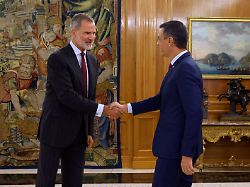Despite election defeat
Sanchez is to form a government in Spain
October 3, 2023, 4:32 p.m
The conservatives emerged victorious in the Spanish election in July. But their leading candidate Feijoo fails to get a government majority. Now incumbent Sanchez is trying to form a coalition again. A difficult task given the possible coalition partners.
King Felipe VI has commissioned acting Prime Minister Pedro Sánchez to form a new government in Spain. The head of state decided this after a new round of consultations with party leaders, said Lower House President Francina Armengol. The lower house of parliament must now set the date for the vote on the 51-year-old socialist politician’s candidacy. Sánchez emphasized that he accepted the assignment “with joy.” On Wednesday he will begin talks for the “new edition of a progressive government”.
After the first round of consultations, Felipe initially commissioned opposition leader Alberto Núñez Feijóo in August, whose conservative People’s Party PP won the parliamentary election at the end of July ahead of Sánchez’s Socialists (PSOE). But Feijóo failed to get a majority in the lower house last week. This was also due to his planned coalition partner, the right-wing populist Vox. Smaller regional parties refused to cooperate.
The socialist Sánchez is given better chances than Feijóo. But he also faces a difficult task. The 52-year-old needs, among others, the votes of the left-wing ERC party of Catalan Prime Minister Pere Aragonès and the conservative Junts party of the separatist leader Carles Puigdemont, who lives in exile in Belgium. Both strive for Catalonia’s independence and, in return for their support, are demanding an amnesty for those separatists who took part in the failed attempt to secede in autumn 2017. They also brought up another independence referendum, which Sánchez has so far strictly rejected.
The socialist is under time pressure: If no head of government is found by November 27th, the Spaniards would have to go to the polls again on January 14th. It’s not just a domestic political blockade that threatens. This would mean that Spain’s entire EU Council Presidency until December 31st would be overshadowed by political uncertainty in the fourth largest economy in the eurozone.
